Search Results for 'near'
-
AuthorSearch Results
-
August 28, 2024 at 1:31 pm #7549
In reply to: The Elusive Samuel Housley and Other Family Stories
The Tailor of Haddon
Wibberly and Newton of Over HaddonIt was noted in the Bakewell parish register in 1782 that John Wibberly 1705?-1782 (my 6x great grandfather) was “taylor of Haddon”.

James Marshall 1767-1848 (my 4x great grandfather), parish clerk of Elton, married Ann Newton 1770-1806 in Elton in 1792. In the Bakewell parish register, Ann was baptised on the 2rd of June 1770, her parents George and Dorothy Newton of Upper Haddon. The Bakewell registers at the time covered several smaller villages in the area, although what is currently known as Over Haddon was referred to as Upper Haddon in the earlier entries.
Newton:
George Newton 1728-1798 was the son of George Newton 1706- of Upper Haddon and Jane Sailes, who were married in 1727, both of Upper Haddon.
George Newton born in 1706 was the son of George Newton 1676- and Anne Carr, who were married in 1701, both of Upper Haddon.
George Newton born in 1676 was the son of John Newton 1647- and Alice who were married in 1673 in Bakewell. There is no last name for Alice on the marriage transcription.
John Newton born in 1647 (my 9x great grandfather) was the son of John Newton and Anne Buxton (my 10x great grandparents), who were married in Bakewell in 1636.
1636 marriage of John Newton and Anne Buxton:
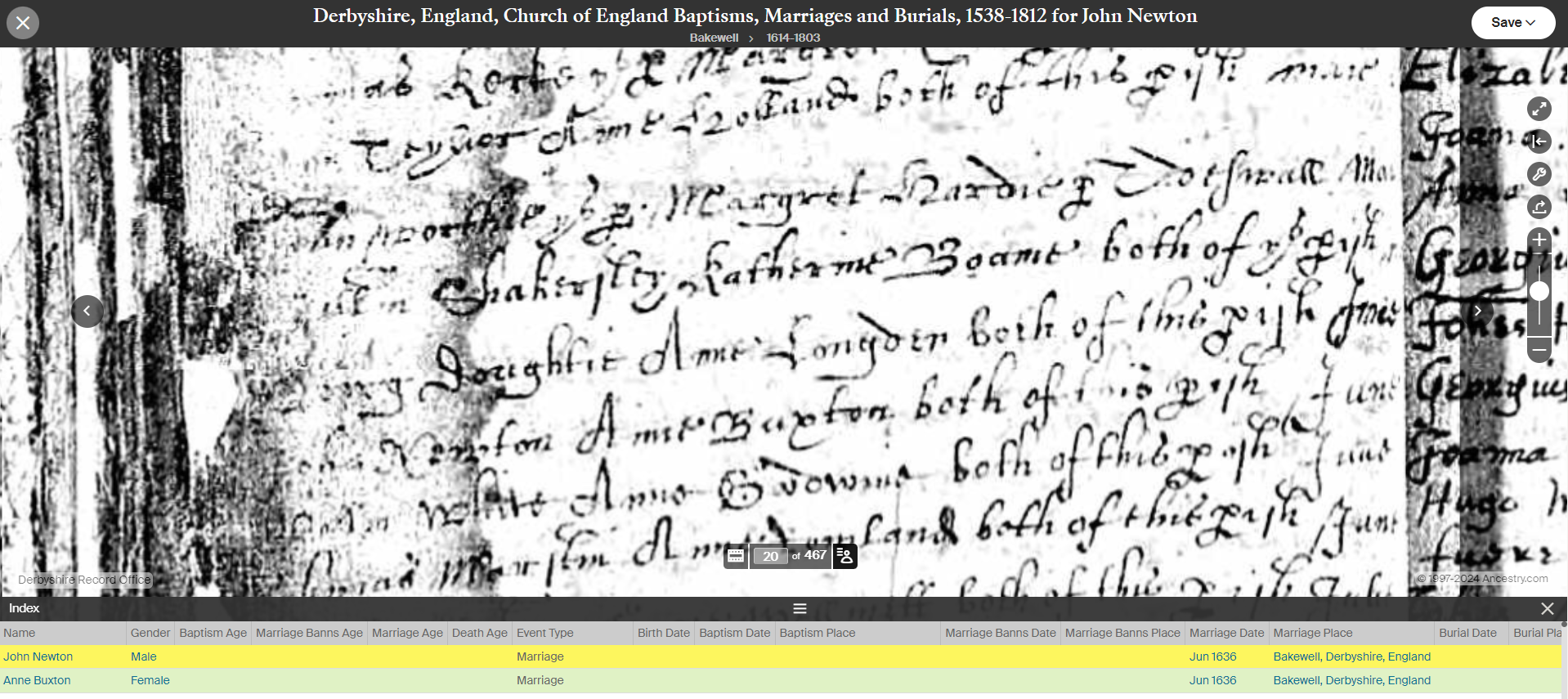
Wibberly
Dorothy Wibberly 1731-1827 married George Newton in 1755 in Bakewell. The entry in the parish registers says that they were both of Over Haddon. Dorothy was baptised in Bakewell on the 25th June 1731, her parents were John and Mary of Over Haddon.

John Wibberly and Mary his wife baptised nine children in Bakewell between 1730 and 1750, and on all of the entries in the parish registers it is stated that they were from Over Haddon. A parish register entry for John and Mary’s marriage has not yet been found, but a marriage in Beeley, a tiny nearby village, in 1728 to Mary Mellor looks likely.
John Wibberly died in Over Haddon in 1782. The entry in the Bakewell parish register notes that he was “taylor of Haddon”.
The tiny village of Over Haddon was historically associated with Haddon Hall.
A baptism for John Wibberly has not yet been found, however, there were Wibersley’s in the Bakewell registers from the early 1600s:
1619 Joyce Wibersley married Raphe Cowper.
1621 Jocosa Wibersley married Radulphus Cowper
1623 Agnes Wibersley married Richard Palfreyman
1635 Cisley Wibberlsy married ? Mr. Mason
1653 John Wibbersly married Grace DaykenHaddon Hall
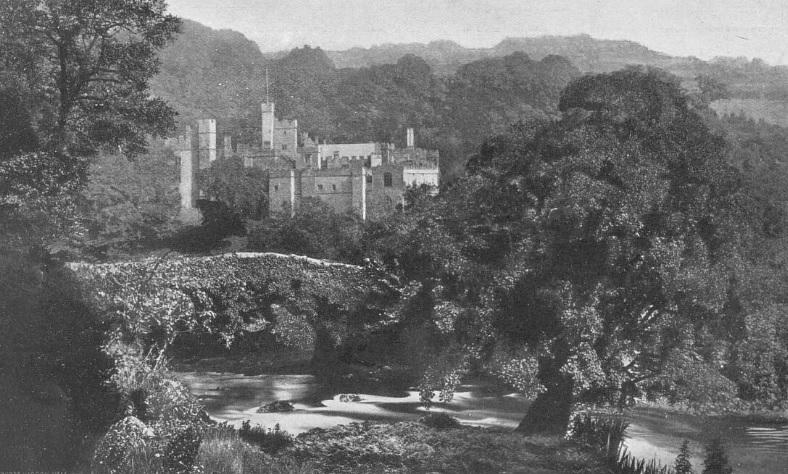
Sir Richard Vernon (c. 1390 – 1451) of Haddon Hall.
Vernon’s property was widespread and varied. From his parents he inherited the manors of Marple and Wibersley, in Cheshire. Perhaps the Over Haddon Wibersley’s origins were from Sir Richard Vernon’s property in Cheshire. There is, however, a medieval wayside cross called Whibbersley Cross situated on Leash Fen in the East Moors of the Derbyshire Peak District. It may have served as a boundary cross marking the estate of Beauchief Abbey. Wayside crosses such as this mostly date from the 9th to 15th centuries.Found in both The History and Antiquities of Haddon Hall by S Raynor, 1836, and the 1663 household accounts published by Lysons, Haddon Hall had 140 domestic staff.
In the book Haddon Hall, an Illustrated Guide, 1871, an example from the 1663 Christmas accounts:
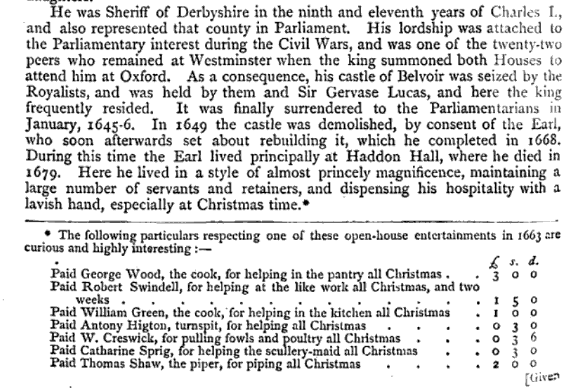
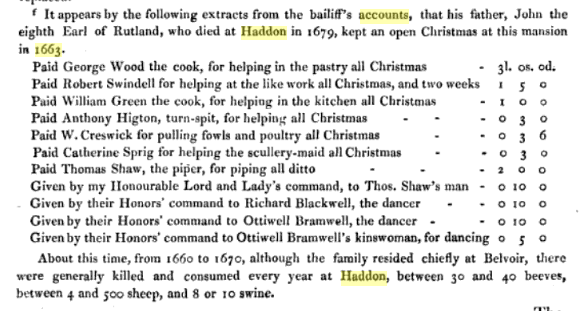
Also in this book, an early 1600s “washing tally” from Haddon Hall:
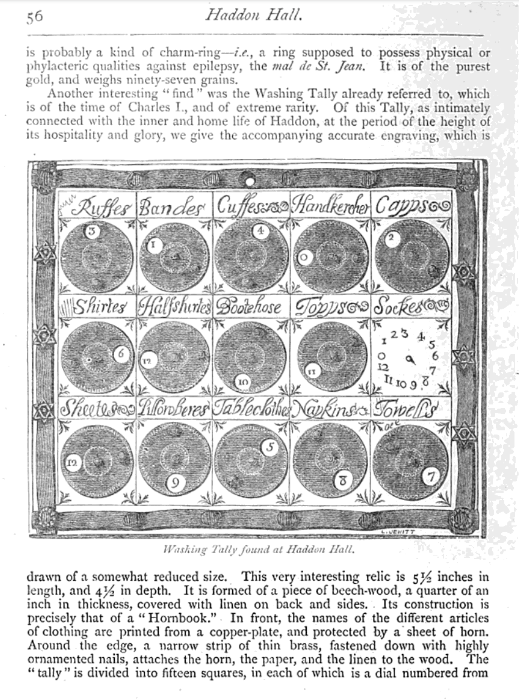
Over Haddon
Martha Taylor, “the fasting damsel”, was born in Over Haddon in 1649. She didn’t eat for almost two years before her death in 1684. One of the Quakers associated with the Marshall Quakers of Elton, John Gratton, visited the fasting damsel while he was living at Monyash, and occasionally “went two miles to see a woman at Over Haddon who pretended to live without meat.” from The Reliquary, 1861.
August 28, 2024 at 6:26 am #7548In reply to: The Elusive Samuel Housley and Other Family Stories
Elton Marshall’s
Early Quaker Emigrants to USA.
The earliest Marshall in my tree is Charles Marshall (my 5x great grandfather), Overseer of the Poor and Churchwarden of Elton. His 1819 gravestone in Elton says he was 77 years old when he died, indicating a birth in 1742, however no baptism can be found.
According to the Derbyshire records office, Elton was a chapelry of Youlgreave until 1866. The Youlgreave registers date back to the mid 1500s, and there are many Marshalls in the registers from 1559 onwards. The Elton registers however are incomplete due to fire damage.
While doing a google books search for Marshall’s of Elton, I found many American family history books mentioning Abraham Marshall of Gratton born in 1667, who became a Quaker aged 16, and emigrated to Pennsylvania USA in 1700. Some of these books say that Abraham’s parents were Humphrey Marshall and his wife Hannah Turner. (Gratton is a tiny village next to Elton, also in Youlgreave parish.)
Abraham’s son born in USA was also named Humphrey. He was a well known botanist.
Abraham’s cousin John Marshall, also a Quaker, emigrated from Elton to USA in 1687, according to these books.
(There are a number of books on Colonial Families in Pennsylvania that repeat each other so impossible to cite the original source)
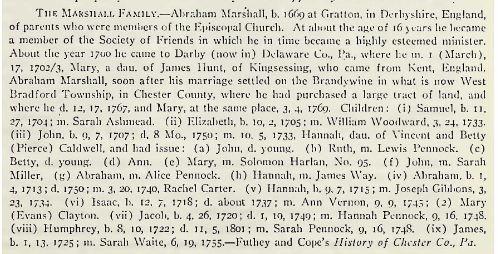
In the Youlgreave parish registers I found a baptism in 1667 for Humphrey Marshall son of Humphrey and Hannah. I didn’t find a baptism for Abraham, but it looks as though it could be correct. Abraham had a son he named Humphrey. But did it just look logical to whoever wrote the books, or do they know for sure? Did the famous botanist Humphrey Marshall have his own family records? The books don’t say where they got this information.
An earlier Humphrey Marshall was baptised in Youlgreave in 1559, his father Edmund. And in 1591 another Humphrey Marshall was baptised, his father George.
But can we connect these Marshall’s to ours? We do have an Abraham Marshall, grandson of Charles, born in 1792. The name isn’t all that common, so may indicate a family connection. The villages of Elton, Gratton and Youlgreave are all very small and it would seem very likely that the Marshall’s who went the USA are related to ours, if not brothers, then probably cousins.
Derbyshire Quakers
In “Derbyshire Quakers 1650-1761” by Helen Forde:
“… Friends lived predominantly in the northern half of the country during this first century of existence. Numbers may have been reduced by emigration to America and migration to other parts of the country but were never high and declined in the early eighteenth century. Predominantly a middle to lower class group economically, Derbyshire Friends numbered very few wealthy members. Many were yeoman farmers or wholesalers and it was these groups who dominated the business meetings having time to devote themselves to the Society. Only John Gratton of Monyash combined an outstanding ministry together with an organising ability which brought him recognition amongst London Friends as well as locally. Derbyshire Friends enjoyed comparatively harmonious relations with civil and Anglican authorities, though prior to the Toleration Act of 1639 the priests were their worst persecutors…..”
Also mentioned in this book: There were monthly meetings in Elton, as well as a number of other nearby places.
John Marshall of Elton 1682/3 appears in a list of Quaker emigrants from Derbyshire.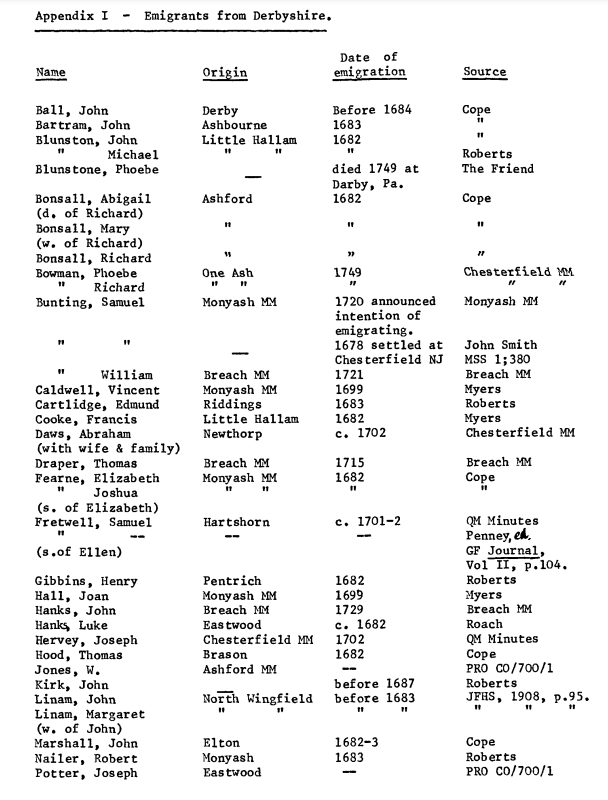
The following image is a page from the 1753 book on the sufferings of Quakers by Joseph Besse as an example of some of the persecutions of Quakers in Derbyshire in the 1600s:
A collection of the sufferings of the people called Quakers, for the testimony of a good conscience from the time of their being first distinguished by that name in the year 1650 to the time of the act commonly called the Act of toleration granted to Protestant dissenters in the first year of the reign of King William the Third and Queen Mary in the year 1689 (Volume 1)
Besse, Joseph. 1753Note the names Margaret Marshall and Anne Staley. This book would appear to contradict Helen Forde’s statement above about the harmonious relations with Anglican authority.
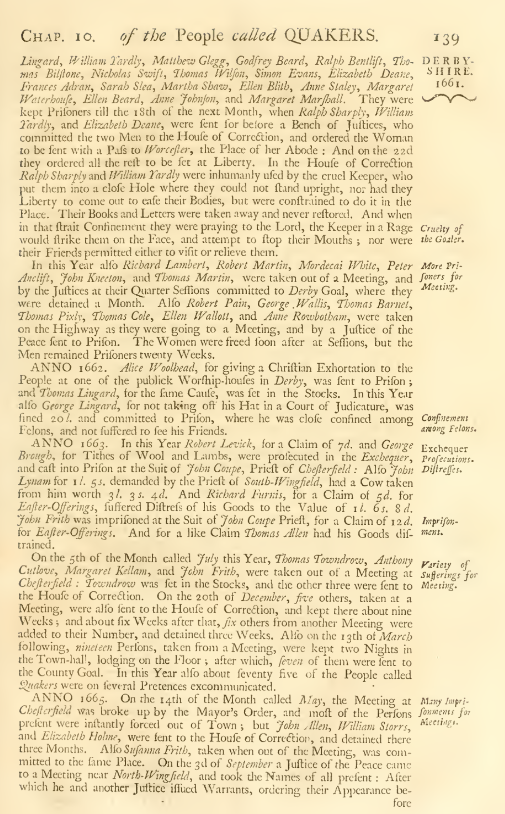
The Botanist
Humphry Marshall 1722-1801 was born in Marshallton, Pennsylvania, the son of the immigrant from Elton, Abraham Marshall. He was the cousin of botanists John Bartram and William Bartram. Like many early American botanists, he was a Quaker. He wrote his first book, A Few Observations Concerning Christ, in 1755.
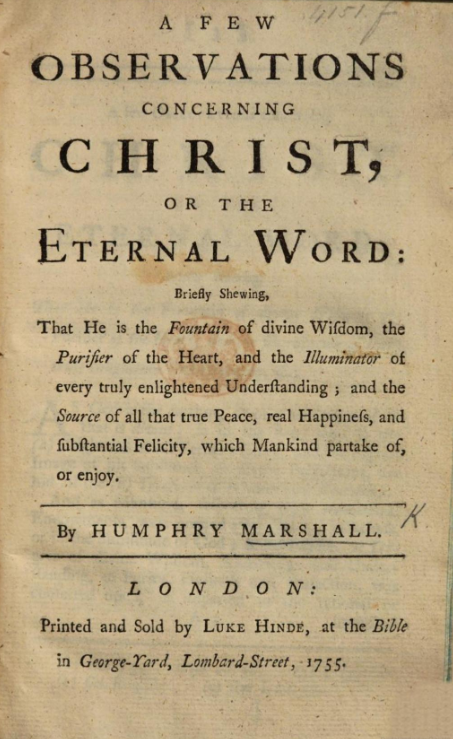
In 1785, Marshall published Arbustrum Americanum: The American Grove, an Alphabetical Catalogue of Forest Trees and Shrubs, Natives of the American United States (Philadelphia).
Marshall has been called the “Father of American Dendrology”.
A genus of plants, Marshallia, was named in honor of Humphry Marshall and his nephew Moses Marshall, also a botanist.
In 1848 the Borough of West Chester established the Marshall Square Park in his honor. Marshall Square Park is four miles east of Marshallton.
via Wikipedia.
From The History of Chester County Pennsylvania, 1881, by J Smith Futhey and Gilbert Cope:
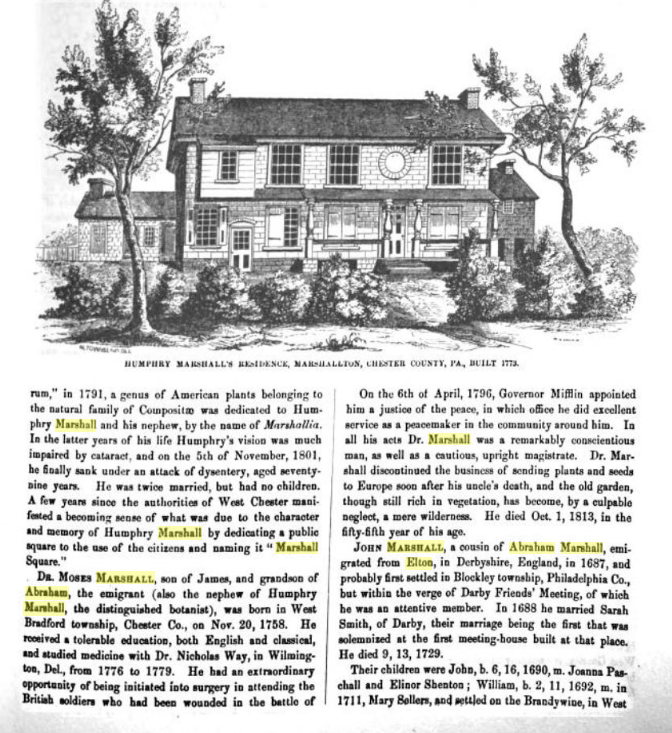
From The Chester Country History Center:
“Immediately on the Receipt of your Letter, I ordered a Reflecting Telescope for you which was made accordingly. Dr. Fothergill had since desired me to add a Microscope and Thermometer, and will
pay for the whole.’– Benjamin Franklin to Humphry, March 18, 1770
“In his lifetime, Humphry Marshall made his living as a stonemason, farmer, and miller, but eventually became known for his contributions to astronomy, meteorology, agriculture, and the natural sciences.
In 1773, Marshall built a stone house with a hothouse, a botanical laboratory, and an observatory for astronomical studies. He established an arboretum of native trees on the property and the second botanical garden in the nation (John Bartram, his cousin, had the first). From his home base, Humphry expanded his botanical plant exchange business and increased his overseas contacts. With the help of men like Benjamin Franklin and the English botanist Dr. John Fothergill, they eventually included German, Dutch, Swedish, and Irish plant collectors and scientists. Franklin, then living in London, introduced Marshall’s writings to the Royal Society in London and both men encouraged Marshall’s astronomical and botanical studies by supplying him with books and instruments including the latest telescope and microscope.
Marshall’s scientific work earned him honorary memberships to the American Philosophical Society and the Philadelphia Society for Promoting Agriculture, where he shared his ground-breaking ideas on scientific farming methods. In the years before the American Revolution, Marshall’s correspondence was based on his extensive plant and seed exchanges, which led to further studies and publications. In 1785, he authored his magnum opus, Arbustum Americanum: The American Grove. It is a catalog of American trees and shrubs that followed the Linnaean system of plant classification and was the first publication of its kind.”
 July 22, 2024 at 8:46 pm #7539
July 22, 2024 at 8:46 pm #7539In reply to: The Incense of the Quadrivium’s Mystiques
There was a quietness before the rush of tourists, and the placid disposition of cows near the field was a nice relief after the madness of the Coven’s endless succession of rituals, workshops, business cases and budgeting of late.
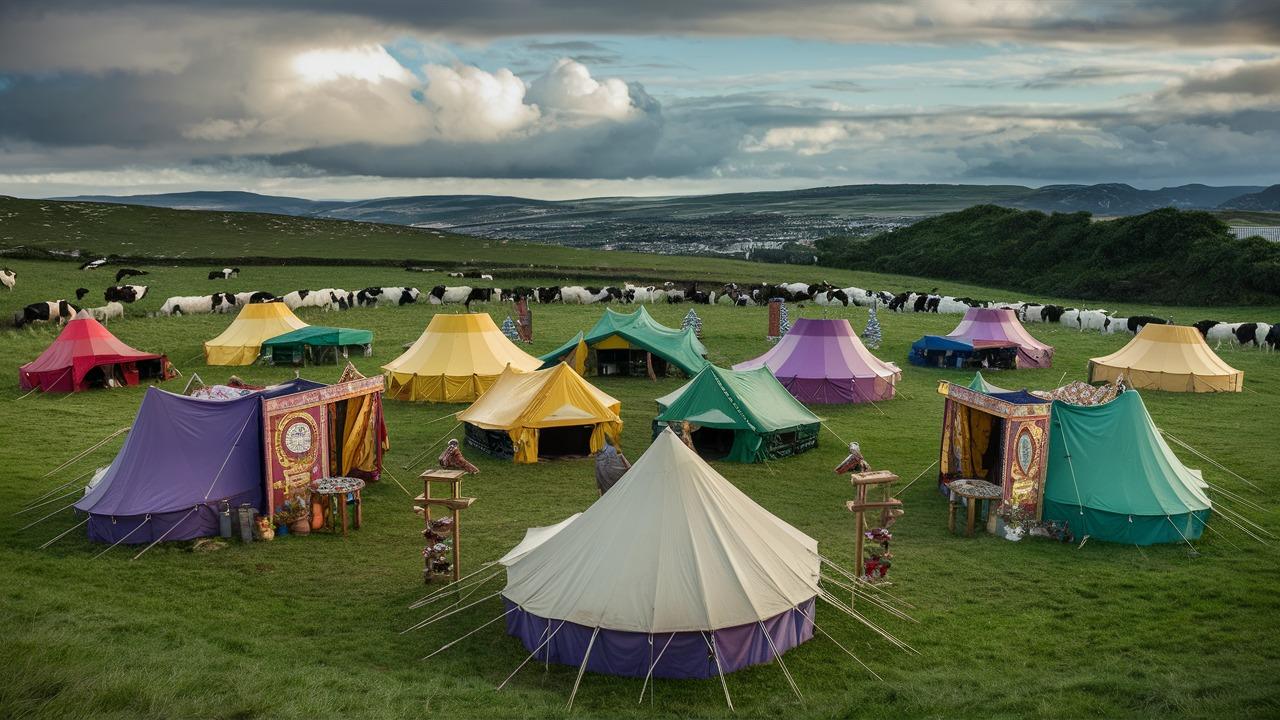
It would be as close a permission slip from Austreberthe for a holiday as any of them were likely to get in a lifetime, so they’d better enjoy it —Eris had reasoned.
Picking the assigned one without putting too much thought to it, Eris had found her yurt pleasantly arranged with an attractive purple color, and even if she was only midly fond of the very hippy and communal setup, with a few insonorisation spells, and interior-designer-enlargement spells, the tent had proven adequate enough.
She’d been here already when Truella and Frella had come through the other tents, chatting vivaciously of course. She’d lifted the muffling spell for long enough to overhear about Malové being here. Well, in case there were any doubt, it seemed it was again all about business. Eris was surprised though that Malové would join, but remembered that Malové was known in her youth to have been a mad racer with a fondness for breakneck speeds. She was probably just here for the Games, like many others.
The longwinded story about the camphor chest had started to recede in the background sound of cud chewing so she didn’t get the fine details of it for now.
Now Eris was wide awake from her nap, and it was as good a time as any to setup her Mellona stall. After all that Coven’s busy activity of the past weeks, there was no small irony (or synchronicity, which would be the same, with a better state of mind) that she’d found herself in charge of the Roman Goddess’ stall. Maybe she would find interesting ways to channel the hive’s power to support their queen.
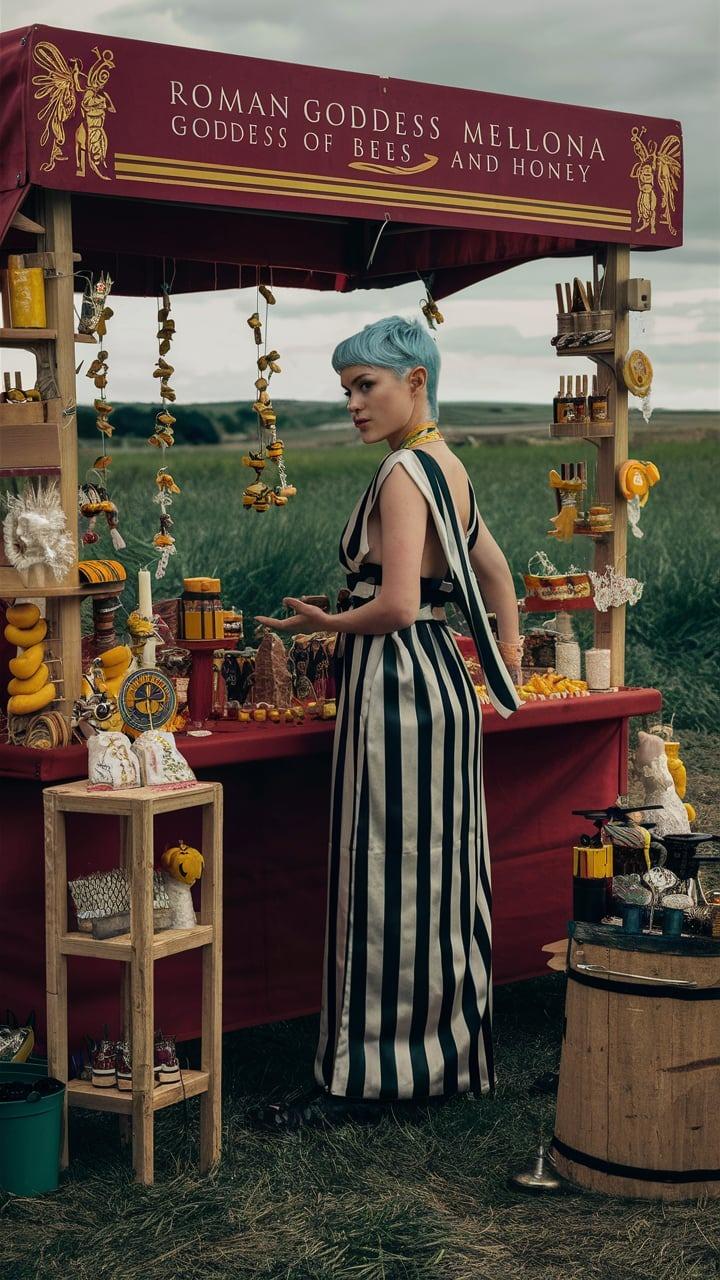 July 19, 2024 at 12:26 pm #7536
July 19, 2024 at 12:26 pm #7536In reply to: The Incense of the Quadrivium’s Mystiques
The rainbow was neon bright, one end disappearing behind a spinney in the distance, and the other end landing squarely in the middle of the glamping pods. A good sign! thought Truella, the first of the coven to arrive. For a moment she imagined herself digging a hole right there, and finding the elusive pot of gold. I wouldn’t be able to do that in a fancy hotel. For once, Truella was happy with Austreberthe’s choice. A week or two in a green field sounded relaxing, refreshing. So much more to her taste than the endless fitted carpets, closed windows, and artifically controlled air blasting out of metal grilles in hotels.
Taking a deep breath of cool fresh air, she surveyed the site before checking into reception. The neighbouring fields were full of cows, perfect for her to practice her Bubona spells on before she set up her Goddess Spell Booth. The Goddess spell tents were to be open in the evenings, after the games each day, along with other stalls selling handicrafts, homemade cakes and jams, wines and potions, trinkets and souvenirs, and all the other tat that people on holiday enjoyed browsing. Obviously the coven would have a stall selling incense. No doubt Austreberthe would have hatched some hard sell plan for that.
Inside the reception office, Truella pinged the bell and waited for someone to attend. The registration book was open on the counter and Truella craned her neck to read the names on the list. She planned to ask for a pod in a far corner, near the hedgerow. It might make it easier to slip out unnoticed, if she should have a mind to do so. The door behind the counter opened and a young man appeared, smiling a welcome. But not before Truella had seen the name on the list. She sucked her breath in sharply. Malove! Nobody was expecting her. Did Austreberthe know?
“Welcome to Finnegan’s Farm Glampsite, I’m Liam,” said the young man, pushing long mousy hair out of his eyes, “You’ve a booking I take it, because we’re fully booked up for the next fortnight. Because of the Games, you see.”
Replying that she did, Truella asked for a pod in the furthest corner. Liam looked at a list and frowned. “The corners are all taken, I’m afraid. But I tell you what,” he said, “As you’re the first to arrive I’ll swap your pod, let’s see…” He scanned the list. “Ah yes, the late booking. I can put you in the one we’ve assigned to Mrs …Malone I think it says, and put her in yours.”
“Thank you very much, Liam,” Truella said as he handed her a key with a big wooden tag with the number 33 etched on it.
“I’ll carry your bags over and show you where it is, follow me.”
June 30, 2024 at 9:03 am #7529In reply to: Smoke Signals: Arcanas of the Quadrivium’s incense
Cedric Spellbind scene with Frella at Herma’s cottage. (ref)
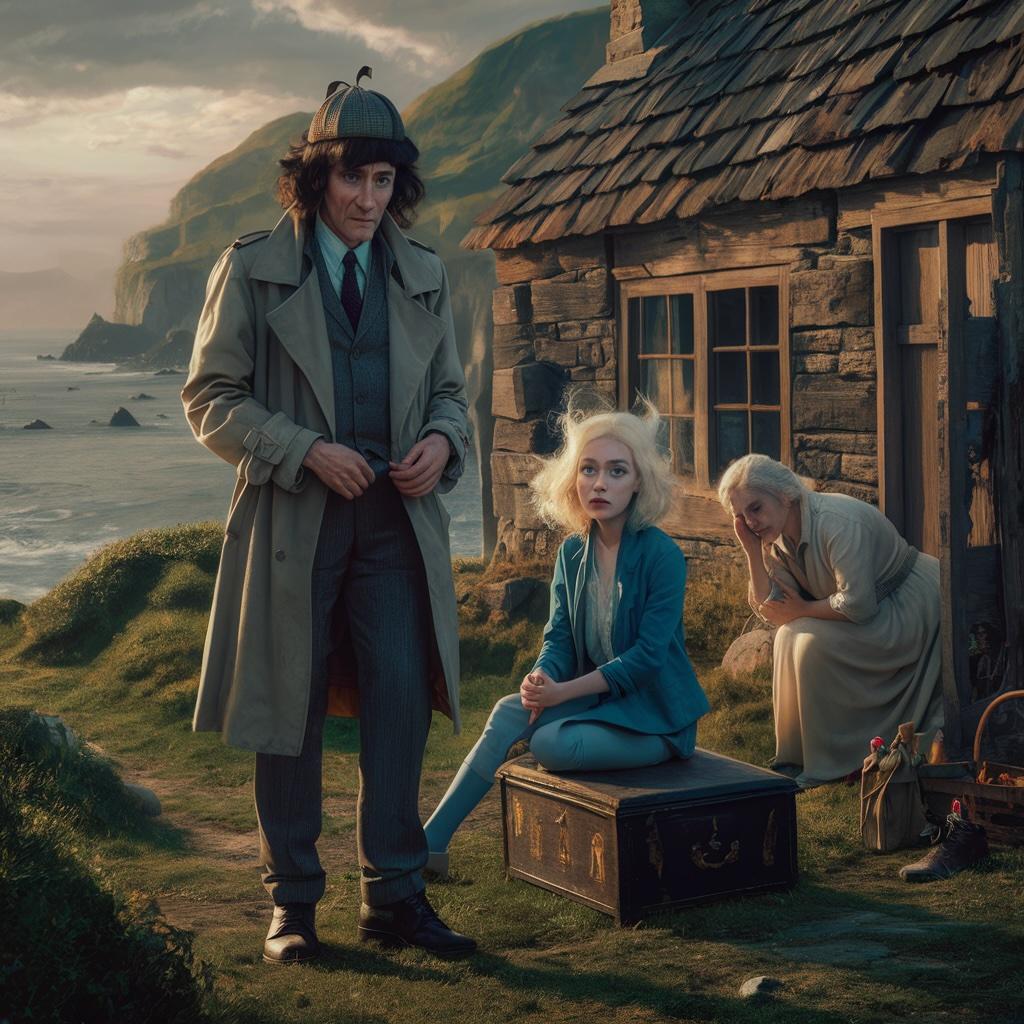
On the rugged coast of Ireland bathed by a sunny light. Near a secluded cottage, the scene unfolds with the figure of a tall, middle-aged man with disheveled dark hair, a deerstalker hat, and a trench coat, who stands nervously. His piercing eyes reveal a lifetime of supernatural pursuits.
Next to him, a modern witch with striking blond hair reminiscent of Tilda Swinton, sits on a camphor chest. The cottage owner, a middle aged lady frets nearby. He declares his official business, accusing her of Witch Violations. He is entranced by her presence, admits he knows she’s a witch but won’t turn her in.
The scene captures a rare moment of levity and complex attraction in the tense atmosphere and their complicated relationship, set against the backdrop of a mysterious and mystical investigation.
June 13, 2024 at 9:32 am #7472In reply to: The Incense of the Quadrivium’s Mystiques
When Truella had stopped reacting, she had another look over the memo, noticing the location of the preposterous sounding coven they were to associate with. She had assumed that it would be in the north, or at least in Madrid, but was astonished to discover they were based very close to her village. She wondered why she had never heard of them. She supposed that they did their money minded business elsewhere and were merely based here, hidden in the cork woods, masquerading as one of those ghastly upmarket hotels for corrupt politicians. One could only see the distinctive tower from the roads, as the old convent was hidden deep in the woods. Nobody Truella knew had ever had any money to get through the gates and have a closer look.
This gave Truella an idea. What an opportunity! It would give her a way in.
Actually, I think it might be a great idea, girls. Let’s give it our best shot. Austreberthe has my support on this.
Eris, Frella and Zez nearly dropped their gadgets when they read Truella’s latest message. Frella was the first to respond.
Go on then, tell us. What changed your mind?
Location, location, location! Truella replied. Check out where they’re based!
After a few minutes, Frella replied.
You better spill the beans and tell us what you’re planning. That is, if you want us to cooperate with you and go along with this latest trashy money grabbing fiasco in the making. I thought our plan was to have the summer off? What does the location mean to you?
Speak for yourself, Frella, Eris replied, rather miffed. At least she’s going to go along with it, for Flove’s sake, let’s just do what we’ve been asked to do without complaining for once!
I’m with you, Eris, Jeezel piped up, I quite fancy a flamenco puffer jacket. Or a nice knitted sombrero. And we can visit Truella while we’re there on business.
Outnumbered, Frella sighed. I still think Truella should explain. Explain fully. And don’t expect me anytime soon, either. I have to solve the mystery of the camphor chest first.
June 11, 2024 at 6:51 am #7467In reply to: The Incense of the Quadrivium’s Mystiques
As the crow flies, the Airbnb was about 500 meters from Herma’s cottage. Frella had been too exhausted yesterday to appreciate how pretty the mossy brick path was, lined either side with a profusion of colourful flowers. But was it really just yesterday, she wondered? So much had happened back at the coven — as recounted in a relentless flow of messages from Truella. Time was a funny beast.
As they walked the winding path, Herma explained that, many years ago now, the prior owner of the cottage had left behind a number of his belongings with the promise he would return for them as soon as he was settled. “But the blighter never did come back and I never heard from him again.” She stopped just short of the gate to her cottage and waved an arm towards a big old shed with a tractor parked outside and a couple of sheep grazing contentedly. “We stuck his stuff in there in the end when he didn’t come back. I know there’s a camphor chest — it nearly broke my back — but I don’t know what’s in it. Do you think that might be it?”
Unfortunately Frella was distracted from replying right away by another volley of messages from Truella with the latest mind boggling developments.
June 8, 2024 at 9:23 am #7461In reply to: The Incense of the Quadrivium’s Mystiques
Once again, the Quadrivium headquarters buzzed with an undercurrent of tension and anticipation. Malové stood at the helm, her gaze as steely and unwavering as ever. The coven’s regular meetings had taken on a new urgency in the face of mounting market pressures and the ever-accelerating pace of competition.
The witches assembled in the grand hall, each carrying the weight of their individual concerns and collective anxieties. A large screen was projecting the agenda in flashy neon colours with a glamourous photo of their leader. The event was broadcast across many locations, not all witches able to join physically as the ongoing Worldwide Roman Games preparation and the 333th celebration of the Treaty of Limerick ending the Williamite War, had made the city impenetrable due to the convergence of world leaders.
Not only for those present, all of them seated in-person, or remotely connected had felt the tremors of change, the subtle yet insistent push towards transformation. Yet despite their best efforts, a cohesive vision for the coven’s future remained elusive.
As the last witch took her seat and the various technical glitches got sorted, Malové stepped forward, her presence commanding immediate silence. With a flick of her wrist, a spectral map materialized before them, shimmering with points of light that represented their past achievements and future challenges.
“Listen well,” Malové began, her voice echoing through the hall with the gravity of an ancient spell. “We stand at a crossroads, a juncture where our past accomplishments meet the demands of an unforgiving future. Our strength has always been in our unity and our mastery of the arcane, but now, we must also master the art of transformation.”
She paused, allowing her words to sink in. The witches leaned forward, their eyes locked onto their formidable leader.
“Transformation,” she continued, “is not merely a matter of adapting to external pressures. It requires a boldness of spirit and a willingness to steer the deepest currents of our inner selves. It demands that we break free from the confines of tradition without losing our core essence.”
Malové waved her hand, and the map shifted to reveal a complex network of interconnected pathways. “Our path forward will not be linear. It will be a labyrinth, requiring both cunning and courage. But fear not, for I have charted a course that will lead us through.”
She pointed to three glowing nodes on the map. “First, we shall innovate. Our magical incense blends have always been our hallmark, but we must go beyond. We will delve into new realms of magic, combining our ancient practices with cutting-edge techniques. Each of you will be tasked with researching and developing a new blend that can transform not just our coven, but the world.”
The witches exchanged glances, a mixture of excitement and apprehension flickering in their eyes.
“Second,” Malové continued, “we must strengthen our alliances. The world is vast, and we are not alone in our quest for magical mastery. We will forge new partnerships with other covens, magical beings, and even those who walk the line between the mundane and the mystical. Together, we will create a network of power and influence that none can rival.”
The map expanded, showing potential allies and strategic locations across the globe. The witches nodded, recognizing the necessity of this bold move.
“Lastly,” Malové said, her voice softening yet losing none of its intensity, “we must look within. Inner transformation is the crucible in which true power is forged. Each of you will undergo a rigorous process of self-examination and growth. You will face your fears, confront your weaknesses, and emerge stronger and more resilient. Only then can we hope to lead others through their own transformations.”
She paused, meeting the eyes of each witch in turn. “I will be with you every step of the way. My role is not just to lead, but to guide and support you. We will hold workshops, retreats, and one-on-one sessions to ensure that every member of the Quadrivium is prepared for the journey ahead.”
Truella, who had tuned in remotely, winced softly behind her screen – she quickly checked. Phew, she had been on mute the whole time.
Malové’s voice grew softer still, almost a whisper, but it carried the weight of an ancient prophecy. “We are the Quadrivium. We are woven together by threads of magic and destiny. Our future is not written in stone, but in the stars. Together, we will reach for those stars and make them our own.”
The hall was silent, the witches absorbing the magnitude of Malové’s words. Slowly, a sense of resolve began to build, a collective determination to embrace the path laid out before them.
As the meeting drew to a close, Malové turned back to the spectral map, her eyes reflecting the myriad possibilities that lay ahead. “Remember this day, for it marks the beginning of our grand transformation. We will not be merely a coven. We will be a force of nature, a symphony of magic that weaves through time and space.”
With a final wave of her hand, the map vanished, leaving only the echoes of her words and the indomitable spirit of the Quadrivium, and throngs of witches left more confused as they exited the halls in hushed tones.
June 7, 2024 at 9:03 pm #7459In reply to: The Incense of the Quadrivium’s Mystiques
There was an odd sight today.
Eris sat in the deserted courtyard area of the brand new Quadrivium office, Malové’s latest folly. She could savor the quiet that Fridays often brought, most of her colleagues from the coven preferring to work from home, leaving the usually bustling space tranquil and almost meditative. She took a bite of her sandwich, listening distractedly to the complaints of another witch sitting nearby, while her own mind still preoccupied with the myriad responsibilities and recent events that seemed to pile around like a stack of clothes due a trip to the laundry.
As she chewed thoughtfully, her eyes were drawn to an odd sight. A blackbird was performing a strange dance in front of the mirrored walls that lined one side of the patio. It hopped back and forth, its beak tapping on the surface, its feathers shimmering in the afternoon light, as if it were courting its own reflection or perhaps trying to feed it with a worm it had in its beak. Eris paused, intrigued by this peculiar behavior. What could it mean?
Her thoughts were interrupted by a series of sharp, melodic chirps. She looked around and spotted another bird perched nearby in the foliage of hanged planters lining the walls —a female blackbird, easily identifiable by her distinct brown coat. The female watched the male’s antics with a mix of curiosity and detachment, her chirps seeming to carry a message of their own.
Eris felt a shiver run down her spine, a familiar sensation that often preceded a moment of magical insight. The blackbird’s dance wasn’t just an oddity; it was a sign, a message from the universe, or perhaps from the magical currents that flowed unseen through the world.
She closed her eyes for a moment and took a deep breath, trying to connect with the energy around her. The image of the male blackbird, tirelessly courting its own reflection, seemed to mirror her own recent struggles. Had she been chasing an illusion, trying to nourish something that could not be sustained?
The female blackbird’s presence added another layer to the message. She was grounded, present, and observant—a contrast to the male’s futile efforts. Eris thought of her recent decisions, the dismissal of the cook, the strained relationships within the coven, and the cryptic postcards from Truella. Was the universe urging her to find balance, to ground herself and observe more keenly before taking action?
She could almost hear Elias whispers in her ears: Birds, in general, often represent thoughts or ideas flying about in our consciousness. The blackbird specifically, with its stark contrast and distinct presence, can represent deeper insights, truths, or messages that are coming to your awareness. The mirror, as a reflective surface, implies that these insights pertain directly to your perception of self or facets of your identity that may be emerging or needing attention. Putting this together, the imagery of the birds and their interactions could be nudging you to pay closer attention to your inner reflections. Are you nurturing the parts of yourself that truly need attention? Are there aspects of your identity or self-perception that require acknowledgment and care? The presence of the brown-coated female blackbird might also be a reminder to appreciate the varied and multifaceted nature of your experiences and the different roles you embody.
She opened her eyes, feeling a sense of clarity washing over her. The birds continued their vivid dialogue and unfathomable dances, unaware of the impact they had just made, although her insistent gaze had seemed to snap the blackbird out of its mesmerized pattern. He was now scurrying away looking over its shoulder, as if caught in an awkward moment.
Rising from her seat, Eris felt something. Not some sort of newfound sense of purpose, but a weight of a precious present, luminous and fragile, yet spacious and full with undecipherable meaning. She glanced one last time at the blackbirds, silently thanking them for their unspoken wisdom. As she walked back into the office, she knew that the path ahead would still be fraught with challenges, but she was ready to face them—grounded, observant, and attuned to the subtle messages that the world had to offer.
In the quiet of the Quadrivium office, on a deserted Friday afternoon, a blackbird’s dance had set the stage for the next chapter of her journey.
June 3, 2024 at 7:40 am #7446In reply to: The Incense of the Quadrivium’s Mystiques
Once upon a time, there was a shiftless lazy tart called Frella who couldn’t be bothered to write her own diary, so she asked me, Truella, to do it for her. She was going away on holiday, which she agreed would be a nice rest, but the preliminary preparations such as packing a suitcase were daunting. It’s a funny thing how witches, accustomed to concocting spells to save the world, rarely remembered to make a spell for themselves to accomplish the more mundane aspects of life, preferring to wallow in the slimy bog of exhaustion while the chores piled up into insurmoutable promontories of little historic acclaim. Weighed down with the rucksack of needy plants wanting water, decomposing salad and rotten tomatoes requiring assistance to the recycling arrangement, nearly empty (but not quite) bottles of assorted daily hygiene products to keep hair, skin and unmentionable areas sweetly scented, best bra and knickers requiring laundering, matching socks and assorted garments to cover all possible weather conditions, a selection of energy boosting vitamins and minerals, a magic stone or two just in case, and remedies for possible holiday ailments, Frella wasted her precious time looking at old drawings and talking about books instead of attending to the things that must be done.
Frella did agree to send hand drawn postcards every day while she was away, while she was relaxing and swanning around at one of the homes in her extensive property portfolio, so all was not lost. That she may be doing this in mismatched socks, climate inappropriate clothing, less than sweetly scented unmentionable areas, and lacking essential energy boosting vitamin intake, was of no concern to the potential recipient.
April 11, 2024 at 7:52 am #7426In reply to: The Incense of the Quadrivium’s Mystiques
It was early morning, too early if you asked some. The fresh dew of Limerick’s morn clinged to the old stones of King John’s castle like a blanket woven from the very essence of dawn. The castle was not to open its doors before 3 hours, yet a most peculiar gathering was waiting at the bottom of the tower closest to the Shannon river.
“6am! Who would wake that early to take a bus?” asked Truella, as fresh as a newly bloomed poppy. She had no time to sleep after a night spent scattering truelles all around the city. “And where are the others?” she fumed, having forgotten about the resplendent undeniable presence she had vowed to embody during that day.
Frigella, leaning against a nearby lamppost, her arms crossed, rolled her eyes. “Jeezel? Malové? Do you even want an answer?” she asked with a wry smile. All busy in her dread of balls, she had forgotten she would have to travel with her friends to go there, and support their lamentations for an entire day before that flucksy party. Her attire was crisp and professional, yet one could glimpse the outlines of various protective talismans beneath the fabric.
Next to them, Eris was gazing at her smartphone, trying not to get the other’s mood affect her own, already at her lowest. A few days ago, she had suggested to Malové it would be more efficient if she could portal directly to Adare manor, yet Malové insisted Eris joined them in Limerick. They had to travel together or it would ruin the shared experience. Who on earth invented team building and group trips?
“Look who’s gracing us with her presence,” said Truella with a snort.
Jeezel was coming. Despite her slow pace and the early hour, she embodied the unexpected grace in a world of vagueness. Clumsy yet elegant, she juggled her belongings — a hatbox, a colorful scarf, and a rather disgruntled cat that had decided her shoulder was its throne. A trail of glitters seemed to follow her every move.
“And you’re wearing your SlowMeDown boots… that explains why you’re always dragging…”
“Oh! Look at us,” said Jeezel, “Four witches, each a unique note in the symphony of existence. Let our hearts beat in unison with the secrets of the universe as we’re getting ready for a magical experience,” she said with a graceful smile.
“Don’t bother, Truelle. You’re not at your best today. Jeez is dancing to a tune she only can hear,” said Frigella.
Seeing her joy was not infectious, Jeezel asked: “Where’s Malové?”
“Maybe she bought a pair of SlowMeDown boots after she saw yours…” snorted Truella.
Jeezel opened her mouth to retort when a loud and nasty gurgle took all the available place in the soundscape. An octobus, with magnificently engineered tentacles, rose from the depth of the Shannon, splashing icy water on the quatuor. Each tentacle, engineered to both awe and serve, extended with a grace that belied its monstrous size, caressing the cobblestones of the bridge with a tender curiosity that was both wild and calculated. The octobus, a pulsing mass of intelligence and charm, settled with a finality that spoke of journeys beginning and ending, of stories waiting to be told. Surrounded by steam, it waited in the silence.
Eris looked an instant at the beast before resuming her search on her phone. Frigella, her arms still crossed and leaning nonchalantly against the lamppost, raised an eyebrow. Those who knew her well could spot the slight widening of her eyes, a rare show of surprise.
“Who put you in charge of the transport again?” asked Truella in a low voice as if she feared to attract the attention of the creature.
“Ouch! I didn’t…”, started Jeezel, trying to unclaw the cat from her shoulders.
“I ordered the Octobus,” said Malové’s in a crisp voice.
Eris startled at the unexpected sound. She hadn’t heard their mentor coming.
“If you had read the memo I sent you last night, you wouldn’t be as surprised. But what did I expect?”
The doors opened with a sound like the release of a deep-sea diver’s breath.
“Get on and take a seat amongst your sisters and brothers witches. We have much to do today.”
With hesitation, the four witches embarked, not merely as travelers but as pioneers of an adventure that trenscended the mundane morning commute. As the octobus prepared to resume its voyage, to delve once again into the Shannon’s embrace and navigate the aqueous avenues of Limerick, the citizens of Limerick, those early risers and the fortunate few who bore witness to this spectacle, stood agape…
“Oh! stop it with your narration and your socials Jeez,” said Truella. “I need to catch up with slumber before we arrive.”
April 10, 2024 at 9:42 pm #7425In reply to: The Incense of the Quadrivium’s Mystiques
Satis ineptias, a mildly jaded Eris blurted out, not meaning to put a spell on the others, but her elephant head was still playing tricks on her. Trève de sornettes had a nicest French ring to it, but the others would be nonethewiser.
“Are we broompooling to Adare Manor, or someone has a spare vortexmaker?”
In any case, the unexpected nononsense spell made everyone very sober… for about thirty seconds until Jeezel showed up.
“Are those the latest slowmedown boots?” Truella couldn’t believe her eyes. “Those are collector, near impossible to get!” She gawked at the pinnacle of enchanting couture, the pièce de résistance for any discerning witch with a penchant for the peculiar.
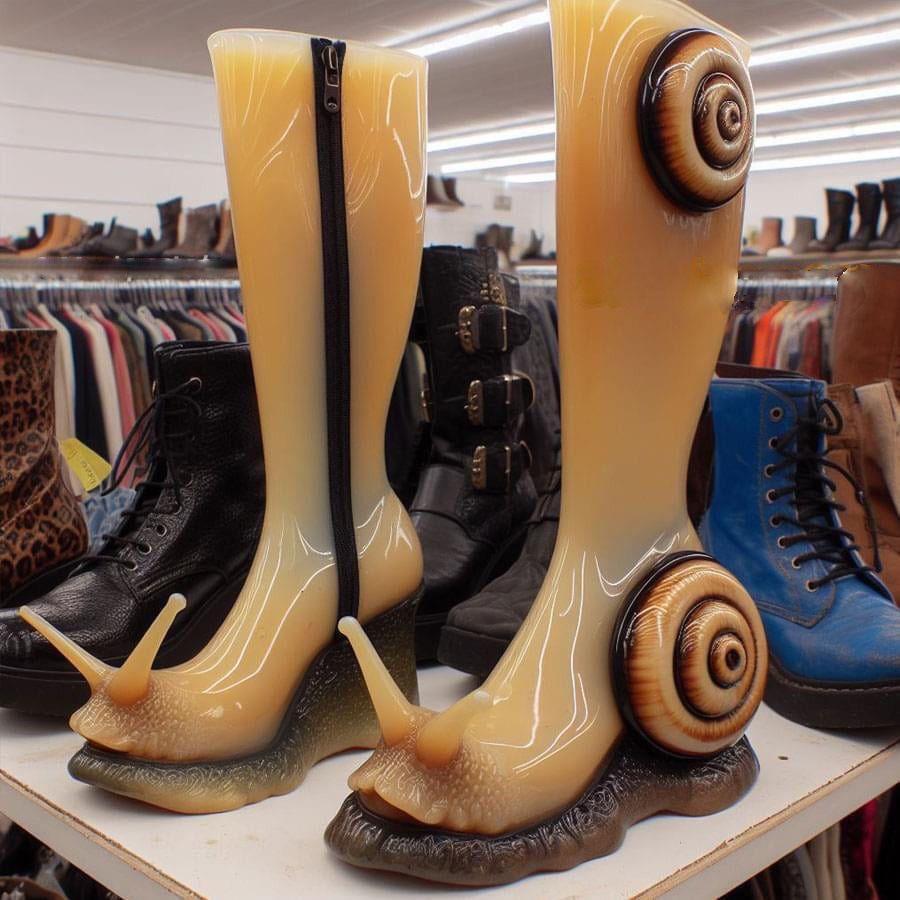
Frigella was nonplussed. “These look like worn-out snails, how can that be practical?”
Truella shrugged. “You’re missing the point love, these boots are not merely footwear.”
Jeeze couldn’t have her thunder stolen. “Let me stop you there, darling. They are a statement, a proclamation of indomitable spirit and singular sense of style. Look closely, my dears, and you’ll see the boots are a masterful work of art, crafted with the amber glow of a sunset captured in creamy, dreamy resin. Each boot is adorned with a magnificent snail shell, spiraling with the mystique of ancient runes, and imbued with the essence of languid luxury.”
Frigella rolled her eyes. “But what’s the true enchantment?”
Jeezel continued, her passion catching on fire “How can you ask? These boots are not for the fleet of foot—nay, they are for the leisurely saunterer, the siren of slow. Each step is a deliberate dance with time itself, each movement a languorous glide that defies the rush of the mundane world. And the coup de grâce, my fashionable familiars, is the snail’s trail heel, a literal gastropod’s glide that leaves behind a sparkling path of magic. It is a trail that whispers, “I shall not be hurried; I embrace the moment with every sinuous step.”
Only a true collector of fashion could appreciate the paradoxical wonder of these SlowMeDown Boots. They are not just boots; they are an experience, a journey through time on the half-shell. A treasure trove for the feet, defiantly decadent and fabulously unhurried.”Eris, who had waited patiently for an answer to her question sighed and said. “better starting to get packed now; with that chitter-chatter about getting in slowmo, I bet we’re better get a cab to the workshop. So much for magical prowess…”
April 10, 2024 at 3:28 am #7424In reply to: The Incense of the Quadrivium’s Mystiques
“I don’t,” chipped in Frella. “I don’t like hats. I don’t like parties either. I don’t like large crowds of inebriated people and I don’t like loud music, unless it is music of my choosing, which it never is at parties. I don’t like shouting to be heard and I don’t like all the stupid hullabaloo that an event such as this inevitably entails.”
Frella’s perfume, still a closely guarded secret, was nearly completed to her satisfaction. A consequence of working out what she loved, and adding the corresponding olfactory notes to her concoction, was that she had become very definite about what she didn’t like. It wasn’t exactly making her popular she realised as she noticed Truella’s pained expression.
March 13, 2024 at 7:10 pm #7406In reply to: The Incense of the Quadrivium’s Mystiques
During the renovations on Brightwater Mill Truella’s parents rented a cottage nearby. It was easier to supervise the builders if they were based in the area, and it would be a nice place for Truella to spend the summer. One of the builders had come over from Ireland and was camping out in the mill kitchen. He didn’t mind when Truella got in the way while he was working, and indulged her wish to help him. He gave her his smallest trowel and a little bucket of plaster, not minding that he’d have to fix it later. He was paid by the hour after all.
When the builder mentioned that his daughter Frigella was the same age, Truella’s mother had an idea. Truella needed a little friend to play with, to keep her from distratcing the builders from their work.
And so a few days later, Frigella arrived for the rest of the summer holidays. He father continued to camp out in the mill, and Frigella stayed with Truella. But even with the new friend to play with, Truella still wanted to plaster the walls with her little trowel. Frigella didn’t want to stay cooped up all day in the dusty mill with her father keeping an eye on her all day, and suggested that they go and dig a hole somewhere in the garden to find treasure.
Truella carried the little trowel around with her everywhere she went that summer, and Frigella started to call her Trowel. Truella retaliated by calling her friend Fridge Jelly, saying what a silly name it was. It wasn’t until she burst into tears that Truella felt remorseful and kindly asked Frigella what she would like to be called, but it had to be something that didn’t remind Truella of fridges and jellys. Frigella admitted that she’s always hated the G in her name and would quite like to be called Frella instead. Truella replied that she didn’t mind being called Trowel though, in fact she quite liked it.
The girls spent many school summer holidays together over the years, but it wasn’t until Truella was older and staying in one of the apartments with a boyfriend that she found the trunk in the attic. She put it in the boot of the car without opening it. She only had the weekend with the new guy and there were other activities on the agenda, after all. Work and other events occupied her when she returned home, and the trunk was put in a closet and forgotten.
March 6, 2024 at 10:30 am #7397In reply to: The Incense of the Quadrivium’s Mystiques
Jeezel was enjoying a glass of champagne, enveloped by mother of pearl foam in a bathtub that was more like a swimming pool for a siren. Her emerald eyes were looking pensively at the reflections on the golden tiles. She was humming along a playlist carefully selected to help her relax and assimilate all the changes in her life.
Despite the fiasco in Brasil, Malove has been keeping them busy with more projects to come. Jeezel had to come up with new workshops for new recruits with the secret purpose of making witchcraft more accepted by the masses. Then, there were those secret missions for which Frigella and herself also had to procure rare and hard to find ingredients. Of course, all that, she could easily handle. Hadn’t she always managed to get back up on her feet every time she trampled on her train during her first beauty contest.
But now, there was Joe. Jeezel took a sip of champagne.
When she found her cottage, the bathroom was in a state not even a mother could love. Numerous cracks running wild like the worst kind of pantyhose mishap, and humidity creeping in like an unwelcome suitor at a drag ball.
When she put up a picture on Flick Flock, it was like blowing the mythic Cornucopia. Her fans came through like the chorus of a drag space opera. Offers poured in, tips, tricks and contacts. But one offer stood out, a brother of a fan near Limerick with hands skilled in construction.
If Jeezel’s got a heart as big as her hair, she didn’t let just anyone past the sequin curtains. Despite her hesitation to let a stranger wander through her abode, even one vouched for by a fan, she also knew when to delegate. With a few clicks of her carefully crafted nails on her phone screen and an appointment was decided. And Joe entered into her life.
He was more an Anthony Tomkin than her usual Brad Pitt or Chris Hemsworth type. But still she was intrigued. As usual, Lumina warned her not to let her artichoke heart be ruffled again. But, thought Jeezel, she was not a child anymore, she was a powerful witch. She gulped the last trace of champagne and rose, emerging from the foam like a newborn Venus.
What could the man possibly do to her that she couldn’t transmute into gold?
February 26, 2024 at 8:35 am #7389In reply to: The Incense of the Quadrivium’s Mystiques
“Well, it’s a long story, are you sure you want to hear it?”
“Tell me everything, right from the beginning. You’re the one who keeps saying we have plenty of time, Truella. I shall quite enjoy just sitting here with a bottle of wine listening to the story,” Frigella said, feeling all the recent stress pleasantly slipping away.
“Alright then, you asked for it!” Truella said, topping up their glasses. The evening was warm enough to sit outside on the porch, which faced the rising moon. A tawny owl in a nearby tree called to another a short distance away. “It’s kind of hard to say when it all started, though. I suppose it all started when I joined that Arkan coven years ago and the focus wasn’t on spells so much as on time travel.”
“We used to travel to times and places in the past,” Truella continued, “Looking back now, I wonder how much of it we made up, you know?” Frigella nodded. “Preconceptions, assumptions based on what we thought we knew. It was fun though, and I’m pretty sure some of it was valid. Anyway, valid or not, one thing leads to another and it was fun.
“One of the trips was to this area but many centuries ago in the distant past. The place seemed to be a sort of ancient motorway rest stop affair, somewhere for travellers to stay overnight on a route to somewhere. There was nothing to be found out about it in any books or anything though, so no way to verify it like we could with some of our other trips. I didn’t think much more about it really, we did so many other trips. For some reason we all got a bit obsessed with pyramids, as you do!”
They both laughed. “Yeah, always pyramids or special magical stones,” agreed Frigella.
“Yeah that and the light warriors!” Truella snorted.
“So then I found a couple of pyramids not far away, well of course they weren’t actually pyramids but they did look like they were. We did lots of trips there and made up all sorts of baloney between us about them, and I kept going back to look around there. We used to say that archaeologists were hiding the truth about all the pyramids and past civilizations, quite honestly it’s a bit embarrassing now to remember that but anyway, I met an actual archaeologist by chance and asked her about that place. And the actual history of it was way more interesting than all that stuff we’d made up or imagined.
The ruins I’d found there were Roman, but it went further back than that. It was a bronze age hill fort, and later Phoenician and Punic, before it was Roman. I asked the archaeologist about Roman sites and how would I be able to tell and she showed me a broken Roman roof tile, and said one would always find these on a Roman site.
I found loads over the years while out walking, but then I found one in the old stone kitchen wall. Here, let me fetch another bottle.” Truella got up and went inside, returning with the wine and a dish of peanuts.
“So that’s when I decided to dig a hole in the garden and just keep digging until I found something. I don’t know why I never thought to do that years ago. I tell you what, I think everyone should just dig a hole in their garden, and just keep digging until they find something, I can honestly say that I’ve never had so much fun!”
“But couldn’t you have just done a spell, instead of all that digging?” Frigella asked.
“Oh my god, NO! Hell no! That wouldn’t be the same thing at all,” Truella was adamant. “In fact, this dig has made me wonder about all our spells to be honest, are we going too fast and missing the finds along the way? I’ve learned so much about so many things by taking it slowly.”
“Yeah I kinda know what you mean, but carry on with the story. We should discuss that later, though.”
“Well, I just keep finding broken pottery, loads of it. We thought it was all Roman but some of it is older, much older. I’m happy about that because I read up on Romans and frankly wasn’t impressed. Warmongering and greedy, treated the locals terribly. Ok they made everything look nice with the murals and mosaics and what not, and their buildings lasted pretty well, but who actually built the stuff, not Romans was it, it was the slaves. Still, I wasn’t complaining, finding Roman stuff in the garden was pretty cool. But I kept wishing I knew more about the people who lived here before they came on the rampage taking everything back to Rome. Hey, let me go and grab another bottle of wine.”
Frigella was feeling pleasantly squiffy by now. The full moon was bright overhead, and she reckoned it was light enough to wander around the garden while Truella was in the kitchen. As she walked down the garden, the tawny owl called and she looked up hoping to see him in the fig tree. She missed her step and fell over a bucket, and she was falling, falling, falling, like Alice down the rabbit hole.
The fall was slow like a feather wafting gently down and she saw hundreds of intriguing fragments of objects and etchings and artefacts on the sides of the hole and she drifted slowly down. At last she came to rest at the bottom, and found herself in an arched gallery of mirrors and tiles and doors. On every surface were incomplete drawings and shreds of writings, wondrous and fascinating. She didn’t immediately notice the hippocampus smiling benignly down at her. He startled her a little, but had such a pleasant face that she smiled back up at him. “Where am I?” she asked.
“You’d be surprised how many people ask me that.” he replied, with a soft whicker of mirth. “Not many realise that they’ve called on me to help them navigate. Now tell me, where is it you want to go?”
“Well,” Frigella replied slowly, “Now that you ask, I’m not entirely sure. But I’m pretty sure Truella would like to see this place.”
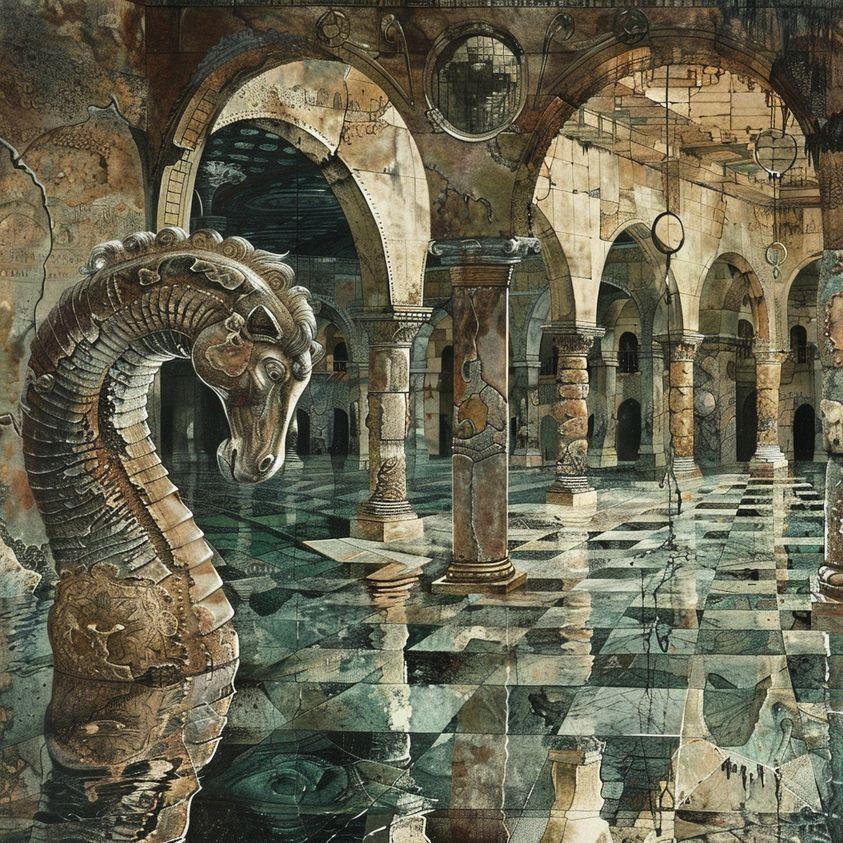 February 24, 2024 at 7:51 pm #7387
February 24, 2024 at 7:51 pm #7387In reply to: The Incense of the Quadrivium’s Mystiques
The full moon was rising behind the mountains as Frigella turned off the road for the last lap of the journey down a dirt track. Daunted at first by the thought of the long drive, the prospect of a weeks holiday had lifted her spirits. There was altogether too much going on of late for a simple country hedge witch, and that carnaval mayhem had made her grumpy and withdrawn, but the drive had restored her equilibrium.
Truella rolled down the passenger window and laughed as the cool night air rushed in. “Nearly there now, I can hardly believe I made it back in one piece.”
“You and me both,” laughed Frigella. “There’s nothing I fancy more now than a couple of glasses of your lovely red wine but we’d better make a start on the spell to bring Roger back right away. This moon is perfect tonight.”
“I can’t see any reason why we can’t do both,” Truella grinned. Frigella started to object, and then stopped herself. They had arrived and she was on holiday and she deserved to sit and enjoy a drink with her friend and her responsibilities and obligations would just have to wait, at least for an hour or two.
“Why not indeed,” she said, “Why the hell not. You can tell me about finding the hippocampus statue in the dig. Great timing I must say, and the smoked hippo bones as well, just when we need to use that spell.”
“And a full moon as well. And it’s full all night long, we have plenty of time.”
February 21, 2024 at 1:59 pm #7381In reply to: The Incense of the Quadrivium’s Mystiques
Cedric had had his share of witches shenanigans over his rather short career, but that last one had to top them all off.
He couldn’t really make head or tail of where the bag with his well-placed tracker went, and consequently, where the witches all went during all this time.
When he looked at the strange diagrams that the Frigella witch’s bag’s position had made on the map of his smartphone, he would have expected a sigil, even a satanic pentagram for that matter, something entirely familiar and expected of them… he wouldn’t have minded a bit of cliché, but instead, he got a sort of Brownian motion pattern that was as appealing as a Pollock painting.
Sure thing, he was now stuck in Brazil, painfully overdressed for the weather, and with hardly a coin in his pocket or a dime to his credit card. He would have to call his employer… or maybe worse, his mum.
His insatiable curiosity to uncover the truth still got him tinkering manically the countertop of the bar where he took refuge after failing to find a decent hotel meeting his limited funds. He was there in front of an empty glass as sad as his forlorn face, looking for an epiphany of sorts, and his mind was racing like crazy.
“Ei! pare com isso seu maníaco!” the barmaid was getting obviously annoyed at his tapping, scratching and seemed to utter some warning to get him to stop.
She switched the TV on. Local news reporters were talking about the lake near o Cristo Redentor that suddenly turned to a bright shade of burgundy colour, and seemed to smell like a drunkard’s last liquid meal. Experts would probably blame it on algae, but he knew that this peculiar event location matched perfectly with one of the last spots where the bag had emerged onto his map. Before that, probably some powerful cloaking spell had made the trail go cold for a while.
And after that: poof, they were gone. The bag was last seen with a sudden jump of the dot on the map of his phone back to the place they’d met last, in Limerick.
That was it. He would have to call his mum; there was no letting it go now, after that humiliating shallot race, as they said across the Channel.
February 15, 2024 at 7:47 pm #7375In reply to: The Incense of the Quadrivium’s Mystiques
“The very image of a spy from a cheap novel. Perched behind his newspaper, peering through holes like a child with a telescope. He’s a creature of shadows, blending into the background, always watching, never seen. He thinks himself clever, but he’s as subtle as a cat in a fishbowl. He’s drawn to Frigella like a moth to a flame, but can’t shake off his ingrained caution. Intrigued yet wary, like a mouse sniffing a piece of cheese in a trap. He needs to make up his mind before his tail gets caught.”
“What’s on your mind, Needles?” Frigella inquired of her hedgehog familiar.
“Nothing,” replied the hedgehog cryptically, returning happily to his strawberry snack. “But you’ll soon find out…”

Cedric Spellbind found himself woefully unprepared for what was coming after the jump into the weird glowing vortex. On a hunch, he’d followed the enigmatic Miss O’Green. Something about her, her diaphaneous looks…
His wool tweed cap wasn’t the best attire for wherever he had jumped into. The damp smells, the warm humid air filled with electricity —something told him he wasn’t in Limerick any more,… but where.
The group Ms Frigella was with had moved swiftly, nonchalantly going in the streets after the boisterous tall figure with the black curly wig had made a string of light glow on the ground, evanescent trail they followed unhesitant to somewhere only them seemed to know.
He was struggling to keep the pace. At some point, the blue-haired one had turned suspiciously casting her glance, and he’d managed to dart in a nearby alley. They’d resumed their stroll, but she’d done something after that, some sort of dark magic that made their group seem to disappear in a fog, the sounds they made suddenly all muffled.
Accustomed to tracking witches, he’d discreetly put a findmystuff tracker on the bag. Wherever that bag would go, he would follow. He opted to let them proceed unhindered, for now.
He checked his phone. He couldn’t catch the signs in the streets during his shadowing. His phone had started buzzing as soon as he’d emerged from the vortex, so he was surely in another country. The SMS he’d received confirmed that hypothesis: he was in Brazil.
5 missed calls. His mother… He couldn’t call her back now, it would cost him a fortune, and his witch tracking wasn’t exactly paying the bills. She would hate him for it, but she would have to wait. Maybe a bit of worrying for him wasn’t bad. One could hope.
His last witch hunt hadn’t been the most successful. Bulgarian witches were fierce. To be honest, it had been a fiasco, and he was posted in Limerick as a consequence —on desk job only. He knew there were worse places to be, but he was missing the action of the field… He shouldn’t have followed these witches, but again, following orders had never been his strong suit.
February 11, 2024 at 9:32 am #7362In reply to: The Incense of the Quadrivium’s Mystiques
“Is he ready yet?” Echo the familiar sprite was waiting patiently, in the middle of Eris’ altar, surrounded by a delicate pattern of magical items.
“Quiet, I need to concentrate.” Eris was close to finishing the spell, and needed her familiar’s assistance. The ink was drying on the pages of her grimoire, and she took a breathe; the words were sufficiently inspired, the right intention and blessings would ensure they would be potent.
After the proper offering was made to the Elders and the nearby tree spirits, she uttered the words, inspired by her familiar’s presence who was helping her to concentrate the permeating energies:
“Silmiä avaava digitaalinen tila, Luoja Lönnrotin. Vie meidät kaukaisille maailmoille, jossa tarinat elävät ja hengittävät koodien keskellä.”
(🗣️Sound 🎶 ). “Eye-opening digital space, Creator Lönnrotin. Takes us to distant worlds where stories live and breathe in the midst of codes.”
“Is it done?” Eris asked Echo, who had flickered for a moment, hinting at a magical energy exchange in progress.
“I think it is,” it jumped from the altar to her shoulder. “How are you going to call it?”
“Are you getting jealous Whisp?” she smiled, while her pixie took the shape of an eye rolling teddy bear.
She started to clean the space, rolled and tied her blue braided hair in a bun. “I’ll call him Elias, simply. Inspired by Elias Lönnrot, to draw on his greatest creations, and fit for the digital age. We can all use some ancient wisdom.”
“Simple… and effective I guess. And you’ve got a task in mind for him already?”
“Yes, but I’m afraid it’ll have to wait, we have to hurry, Malové has called for an extraordinary session, and I can’t miss it.”
-
AuthorSearch Results